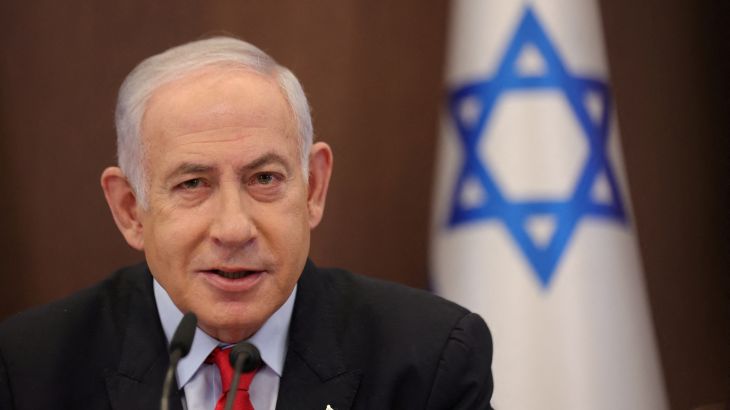What is the Israeli unity government and what does it want to achieve?
Israel’s Benjamin Netanyahu joins political rivals to create a unity government and war cabinet to oversee the fight against Hamas.

Israel’s parliament has approved Prime Minister Benjamin Netanyahu’s emergency unity government, including a number of centrist opposition lawmakers, to display its determination to fight the war with Hamas in Gaza.
Here is what there is to know:
Keep reading
list of 3 itemsIsrael using white phosphorus in Gaza, Lebanon, endangering civilians: HRW
Photos: Israel strikes on Gaza refugee camp kills dozens of Palestinians
What is an Israeli unity government, and what does it want to achieve?
A national unity government, according to Israel, is a “government based on a broad coalition, the members of which also include representatives of rival parliamentary groups”.
This is usually formed at times of national emergencies such as war, natural disasters or economic crises.
Before Hamas’s surprise attack on Saturday, Israeli politics had faced turbulence over a push by Netanyahu’s government to overhaul the country’s judiciary that sparked the largest protest movement in Israel’s history.
“The most important action [now] is to establish the unity of the nation,” Netanyahu said in a speech, according to a report by the Wall Street Journal. “The division within us is over. We are all united. And when we are united – we win,” he added.
The Israeli government established an emergency unity government and a war cabinet.
What can the unity government do?
In a statement, the unity government said it would not promote any unrelated policy or laws, except those related to the continuing fighting with Hamas in Gaza.
Under the agreement, former Defence Minister Benny Gantz and members of his small centrist party will join Netanyahu’s coalition, one of the most right-wing governments in Israel’s history, which Gantz had previously bitterly opposed.
The leader of the largest opposition party in parliament, former Prime Minister Yair Lapid, refused to join the unity government.
What are the objectives of the Israeli war cabinet?
According to Al Jazeera’s Hoda Abdel-Hamid, the main goal is to direct the offensive against Hamas.
“This war cabinet has full control over the operations of the military,” Abdel-Hamid said from West Jerusalem.
“The stated goal of the military is to eliminate Hamas’s military capability. There has been no talk of the civilian arm of Hamas.
“If the war cabinet wants to broaden the scope of this war, then it will have to consult the wider emergency unity government,” she added.
Abdel-Hamid said the establishment of a war cabinet also eased some of the pressures Netanyahu might face during the conflict.
“This war cabinet will take away accusations against Netanyahu that he is going at it alone, that he’s making his own decisions, and that he doesn’t have people who have extensive military experience within his ruling coalition,” Abdel-Hamid explained.
Who forms part of the war cabinet?
Israel’s three-member war cabinet would include Netanyahu, Gantz and Defence Minister Yoav Gallant.
The statement said that Gadi Eisenkot, also a former army chief from Gantz’s party, and Strategic Affairs Minister Ron Dermer will serve as observers.
A seat would be “reserved” for Lapid in the war cabinet.
Who is Benny Gantz, the opposition member of the cabinet?
Gantz is an Israeli politician and retired army general with a 38-year career.
His career included overseeing a 1989 operation to airlift close to 15,000 Ethiopian Jews to Israel.
He also served as chief of staff during two military assaults on the besieged Gaza Strip in 2012 and 2014 for which he and the government faced international criticism.
A joint study by Amnesty International and Forensic Architecture cited “strong evidence” of war crimes and possible crimes against humanity on August 1, 2014, as Israeli forces bombarded residential areas in Rafah following the capture of one of its soldiers.

A UN report in 2015 concluded that both Israel and Palestinian groups had probably committed war crimes during the 51-day conflict.
When entering politics, Gantz managed to unite “an opposition that lacked leadership for years and seemed to offer a viable political substitute to Netanyahu”, according to research conducted by the Brookings Institution.
Once praised by Netanyahu as an “excellent officer” to whom Israelis owed gratitude, the prime minister also branded him a “weak leftist”.
In response to the pandemic in 2020, Gantz and Netanyahu formed an emergency government, but it collapsed six months later.